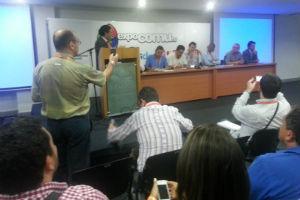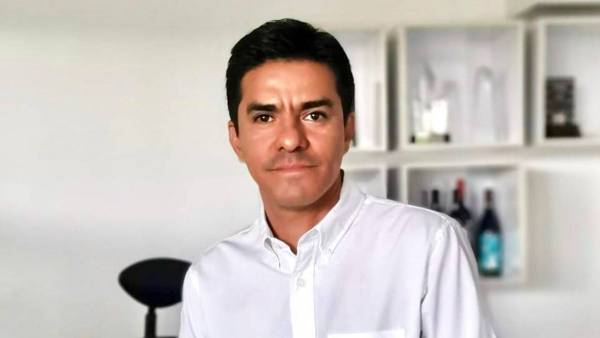 In a debate during the ComuTV 2013, the ANTV assured that its work is focused on strengthening community television, although the sector considers otherwise. They reiterated the call to ignore Resolution 433.
In a debate during the ComuTV 2013, the ANTV assured that its work is focused on strengthening community television, although the sector considers otherwise. They reiterated the call to ignore Resolution 433.
By Richard Santa
After receiving until mid-October 200 communications, a demand for nullity, marches and a call for disobedience, the National Television Authority decided to study Resolution 433 that changed the rules for community television and make the modifications it deems appropriate taking into account the comments of the sector.
This was announced by the director of the National Television Authority, Ramón Angarita, during a panel organized within the framework of the ComuTV fair, which was held in Medellín and in which different actors in the sector participated. The executive said that the intention of the ANTV is to strengthen community television and not end it, as some in the sector think.
A month after that panel, the ANTV put to consideration the project through which it seeks to modify Resolution 433 in which it organized in six points the total of the communications received by the regulatory entity, the same ones that it analyzed and responded. In total, three of the six proposed points will be amended.
Comments
The first has to do with the term of the licenses. The organized communities stated that the imposition of a term on licenses for the provision of the public service of community television is contrary to the fundamental rights of due process and private property. The above assertion is based on the fact that these licenses were granted by the then National Television Commission without a term of time.
The second point speaks of the rights acquired for the provision of the service, in which the organizations allege that the licenses for the provision of the public service of community television are an integral part of the assets of the concessionaires, thus constituting an acquired right and it would be impossible to change their rules.
Regarding the two previous points, the ANTV reiterated that the licenses granted to operate the community television service constitute a temporary right, subject to the regulations issued including the respective modifications. It adds in its reply that nowhere in the rules governing Community TV does it provide that the licences granted for that purpose are of an indefinite nature, so that it can be referred to as an acquired right, or of the prohibition to establish a term of validity for such licences.
The third point has to do with compliance with the Regulations on Copyright and related rights. Community TV stated that the request to have updated authorizations for the retransmission of incidental signals is contrary to Law 182 of 1995, which defines incidental signals as "that which is transmitted via satellite and that is intended to be received by the general public of another country, and whose radiation can be captured in Colombian territory without the need for the use of decoder equipment."
In response, the ANTV recognizes that the reception of incidental signals is free. The authorization to which this administrative act refers is appropriate only for the distribution of the signals and emission or retransmission of the works or artistic services contained therein. However, the entity clarified that the content of the ANTV Resolution will be modified, establishing that the organized communities must comply with current regulations on copyright and related rights.
The fourth point is one of the most controversial and with the highest number of communications that talk about the reduction in the number of associates. The organizations indicate that the number of members should not be limited, as these provisions contradict the constitutional right to free association, and the rights acquired by organized communities.
The ANTV did not accept this point because the restriction to six thousand subscribed is due to the Free Trade Agreement signed between Colombia and the United States, therefore it is a matter that has been subject to prior treatment by a hierarchically superior norm and that was supported by the Council of State.
Another of the most controversial is the fifth point, referring to risk hedging mechanisms. Community TV is unhappy with the established amount; Likewise, they have expressed their concern about the ability to contract the mechanisms of risk coverage, for reasons of cost and the refusals of the insurance companies to issue the policies.
On this issue, the ANTV also agreed to modify what is stated in Resolution 433, once it has been verified that the entity is not exposed to risks. The modification includes the values of such coverages and the date on which they must be submitted. In this sense, the organized communities will have until January 15, 2014 to present the coverage mechanism, as long as it has an initial validity no later than December 31, 2013.
The sixth and final point, which had also generated great annoyance, is about the declaration of knowledge of the Regulations by the organizations, because the wording of the annex, which puts at the head of the legal representative the responsibility for ignorance of the rules by the associates. Taking into account this obligation, the ANTV will modify the Annexes, in the sense that the legal representative knows the normative and regulatory framework of community television.
In its draft resolution to amend Resolution 433 of 2013, the ANTV included 15 changes, including the three mentioned above, and was put up for comment until mid-November. While that process is being carried out, the regulator suspended the presentation of the compliance document, which has a deadline of November 10.
Mixed reactions
Although at the time of closing of this article the deadline for submitting comments on the draft amendment to Resolution 433 had not ended, the representatives of community television have divided positions on the issue. While some say they were heard and what the law allowed, others said that little changed and that they remained without being taken into account.
William Galindo, manager of Viboral TV and president of ComuTV, said that the concepts presented by the sector were taken into account, that at least this time the ANTV was judicious and analyzed them, demonstrating that some points did not have a legal basis.
"What came out in the modification was what could be done. Basically the problem is in two fundamental things, the policies, it is a point that we have to continue discussing because they are still too high. The issue of the limit of 6,000 associates is another point. In Colombia there are only 11 community TV systems that exceed that limit, which represent a little more than 1%, with them they will have special treatment, the rest have no problem, "explained William Galindo.
He added that against the issue of copyright they can not do anything because it is consigned in the Free Trade Agreement. And about the number of channels encoded, he indicated that all ask to have more channels than the seven allowed, but that most systems only have four or five.
Fernando Rivera Villamil, of the National Council of Community Television, has a different opinion, who assured that the meetings and communications addressed to the ANTV were not taken into account and that the modification project does not change fundamentally, such as compensation quotas, policies and the limit of coded channels excused in the FTA.
"As our comments have not been taken into account, we decided to elaborate a concrete document of five points in which we made clear proposals and it was addressed to the ICT Ministry and the ANTV. The reality is that the modification does not change fundamentally, we continue to be harmed," he said.
What about policies? Resolution 433 requires all community TV systems to have an annual policy of 300 million pesos, an amount that for many is high and adds that insurers are reluctant to provide the policy to operators. Also, in the case of a new trader, this is the money they have as capital, then they could not comply with the policy.
William Galindo makes a final reflection: "Community TV is like a rebellious child who is moving into adolescence. The country and telecommunications are transforming but community television remains stagnant. And that is what the standard is doing, as the director of the ANTV himself said, we are tightening the standard to make organizations more competitive. The only problem we have is that of the policies."

























Leave your comment